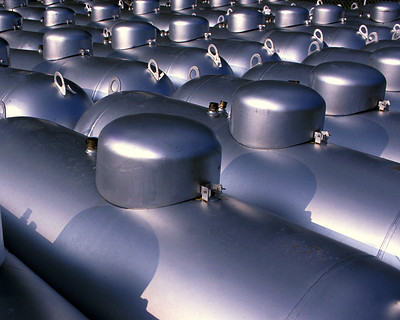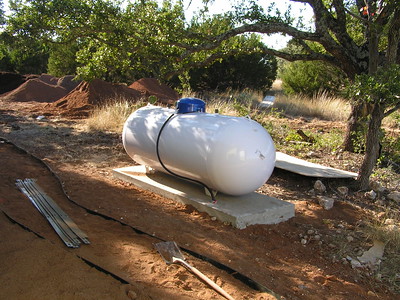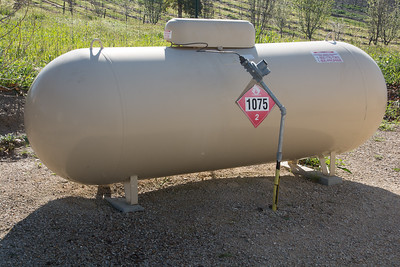
If you’ve ever used propane as a fuel source, you might have wondered how much a 500-gallon propane tank weighs. While it might not be something you think about daily, knowing the weight of a propane tank is essential for safety, transportation, and installation purposes.
As propane tanks play a critical role in residential, commercial, and industrial applications, understanding their weight can help you make informed decisions about their handling and use. In this comprehensive and friendly-toned article, we will explore the factors that contribute to the weight of this size of propane tank, how to determine its total weight when full, and the practical implications of this knowledge.
So, sit back, relax, and join us on this fascinating journey into the world of propane tanks!
Read this article: Is 500 Gallon Propane Tank The Right Size for Your Home?
How Heavy Really This Size of Tank
A 500-gallon propane tank has two main components when considering its weight: the weight of the tank itself (empty) and the weight of the propane it can hold.
- Empty tank weight: The weight of an empty 500-gallon propane tank can vary depending on the manufacturer and materials used, but a typical weight range is between 950 and 1,200 pounds (430-544 kg).
- Propane weight: Propane has a specific gravity of 0.493, which means it weighs 4.11 pounds per gallon at 60°F (1.87 kg per liter at 15.6°C). A 500-gallon tank can hold up to 80% of its capacity in propane to allow for expansion, so it would contain 400 gallons (1,514 liters) of propane when full. The weight of the propane itself would be approximately 400 gallons x 4.11 pounds per gallon = 1,644 pounds (746 kg).
So, a full 500-gallon propane tank (including the tank and the propane inside) would weigh between 2,594 and 2,844 pounds (1,176-1,290 kg), depending on the weight of the empty tank.
Tank Construction and Material Has Effect to How Much the Tank Weighs
When you’re considering a propane tank, especially the sizable 500-gallon ones, it’s essential to understand what they’re made of and why. These tanks aren’t just any containers; they’re designed specifically to store and supply propane safely and efficiently. Here’s what you need to know about the materials used in their construction and how it affects their weight.
Materials Used in Propane Tanks Construction:
Steel:
- Type: Most propane tanks you’ll encounter are made of high-grade steel. This isn’t by accident; steel provides an excellent balance between strength and flexibility. While it’s inherently corrosion-resistant, you’ll often find these tanks painted or coated to further ward off rust.
- Why it matters to you: Steel’s durability ensures that the tank can handle the pressurized nature of stored propane. Plus, with proper maintenance, it’s going to last you a long time.
Aluminum (less common): - Type: On occasion, you might come across propane tanks made from aluminum. Though these are less common, especially for the large tanks, there are situations where the lightweight nature of aluminum has its advantages.
- Why it matters to you: Aluminum doesn’t rust and is lighter than steel. So if weight is a primary concern for you, this could be an option to consider.
How Material Type and Thickness Impact Weight:
Material Density:
Between steel and aluminum, steel is denser. So if you have two tanks of the same size, one steel and one aluminum, you’ll find the steel tank is typically heavier. However, remember, for the robust 500-gallon tanks, steel is predominantly the material of choice due to its strength.
Wall Thickness:
If you’re wondering why some tanks are heavier than others, the thickness of the tank wall is a direct factor. A tank designed for more challenging environments or higher pressures might have a thicker wall. While this makes the tank heavier, it also makes it safer and more durable.
For you, this means understanding where you’ll use the tank and the conditions it’ll face can help you decide on the ideal wall thickness.
Additional Components and Coatings:
When you account for the tank’s weight, don’t forget about fittings, gauges, valves, and other components. They all add up.
Also, the protective coatings or paints, although they’re there for a good reason—to prevent corrosion—add a bit to the tank’s weight. But in the grand scheme of things, this added weight is often minor compared to the tank and the propane inside.
So, next time you’re in the market for a propane tank or just curious about the one you have, remember that its weight isn’t just about the propane inside. The construction material and design choices play a pivotal role, ensuring you get the best balance of safety, durability, and functionality.
Tare Weight (Empty Tank) vs. Gross Weight (Full Tank)
When you delve into the specifics of propane tanks, two terms that you’ll frequently encounter are “tare weight” and “gross weight.” Understanding the distinction between them is crucial, especially if you’re involved in transporting, purchasing, or managing propane tanks.
Definition and Differentiation:
Tare Weight (Empty Tank):
- Definition: This refers to the weight of the empty propane tank, without any propane inside. It includes the weight of the tank’s body, valves, fittings, and any other built-in components.
- Why it matters to you: Knowing the tare weight helps you understand the base weight you’re dealing with before any propane is added. It’s especially valuable if you’re transporting empty tanks or considering where to install one.
Gross Weight (Full Tank):
- Definition: This is the combined weight of the empty tank (tare weight) plus the weight of the propane it contains when full.
- Why it matters to you: If you’re transporting or handling a filled tank, this is the total weight you need to be prepared for. It’s also essential for safety regulations and ensuring that vehicles or structures can support the full weight.
Typical Tare Weight of a 500-Gallon Propane Tank:
For a standard 500-gallon propane tank, the tare weight typically ranges between 950 to 1,050 pounds (or approximately 430 to 475 kilograms). However, you should always check the tank’s specific manufacturer details or the label on the tank, as this can provide the most accurate tare weight for that particular unit.
Potential Variations in Tare Weight Based on Manufacturer and Design:
1. Material and Thickness: As mentioned earlier, the material and thickness of the tank can affect its weight. While most 500-gallon tanks are made of steel, variations in steel grades or wall thickness can result in different tare weights.
2. Additional Components: Some tanks come with added features or components, like advanced valves, gauges, or safety mechanisms. These additions, while beneficial, can also contribute to a slightly higher tare weight.
3. Protective Coatings: The type and thickness of protective coatings or paints can cause minor variations in tare weight. Some coatings might be thicker or denser than others, depending on the manufacturer’s choices.
4. Manufacturing Process: The precision and techniques used in the manufacturing process can lead to slight weight variations between tanks, even if they are of the same model.
When you’re dealing with a 500-gallon propane tank, or any propane tank for that matter, understanding the difference between tare weight and gross weight is essential. It ensures safety, proper handling, and compliance with regulations. Always refer to the manufacturer’s specifications or the label on the tank to get accurate weight details.
Propane Weight and Volume Correlation
When dealing with propane, it’s incredibly valuable for you to grasp the relationship between its weight and volume. This understanding not only helps you gauge how much propane you’re storing but also lets you predict the total weight you’re dealing with. Let’s break it down for you.
Physical Properties of Propane:
- Weight Per Gallon:
- At room temperature (around 60°F), a gallon of liquid propane weighs about 4.2 pounds. This weight can have slight variations depending on factors like temperature and propane purity, but 4.2 is a good ballpark figure for you to keep in mind.
- Why you should care: This figure is your go-to when estimating the weight of propane you’re buying or trying to determine how heavy a filled tank might be.
- State Changes:
- Inside your tank, thanks to the pressure, propane stays in a liquid state. However, when you open a valve and release some of that pressure, the propane starts to turn into a gas, which is how you use it as a fuel.
- It’s also worth noting for your safety that at temperatures below -44°F, propane is a cold, dense liquid. But once the temperature rises above this point and the pressure is right, it becomes a gas.
- Why you should care: Getting a handle on these state changes ensures you use propane safely and efficiently. It’s all about keeping it liquid in the tank and gas when burning it.
Figuring Out the Propane Weight for a 500-Gallon Tank:
If you’re curious about the weight of propane in a full 500-gallon tank, the math is pretty straightforward. Just take the tank’s volume (500 gallons in this case) and multiply it by the weight of propane per gallon.
Here’s how it works out: 500 gallons x 4.2 pounds/gallon = 2,100 pounds
So, when you fill up a 500-gallon propane tank, the propane itself will weigh around 2,100 pounds.
Safety Considerations Related to Tank Weight
Navigating the world of propane tanks? It’s essential for you to realize that their weight isn’t just a spec on a data sheet—it’s directly linked to safety. Here’s why understanding tank weight matters and the risks that come with getting it wrong.
Relevance of Understanding Tank Weight for Transportation and Installation:
- Transportation:
- When you’re moving a propane tank, whether it’s on a truck or any other vehicle, knowing its weight ensures you don’t exceed the vehicle’s weight limits. Overloading can lead to reduced vehicle control, increased stopping distances, and even structural damage.
- Why it matters to you: Safety on the road is paramount. Ensuring you’re within weight limits minimizes risks during transportation.
- Installation:
- Whether you’re placing a tank above ground or underground, the surface or structure it sits on must handle its weight. This is especially true for larger tanks, like the 500-gallon ones.
- Why it matters to you: An incorrectly installed tank can shift, sink, or even rupture, leading to potential propane leaks or structural damages.
Risks Associated with Incorrect Handling Due to Weight Miscalculations:
- Personal Injury:
- If you underestimate a tank’s weight, lifting or moving it can lead to back injuries, muscle strains, or accidents.
- Equipment Damage:
- Using equipment not rated for the tank’s weight can lead to malfunctions or breaks, which might further cause accidents or property damage.
- Potential Propane Leaks:
- If a tank is dropped or mishandled due to weight miscalculations, it might suffer damages that can lead to dangerous propane leaks.
Factors Affecting Weight Variability
While you might think a propane tank’s weight is standard, several factors can cause variability. Let’s look at some elements that might just tip the scale.
- Manufacturing Differences:
- Not all propane tanks are created equal. Different manufacturers might use varied materials, or slightly different processes, all of which can lead to weight differences.
- Why it matters to you: When buying or handling a tank, always refer to the specific weight given by its manufacturer rather than general estimates.
- External Attachments or Modifications:
- Maybe a tank has added gauges, protective structures, or other modifications. These can add to the tank’s weight.
- Why it matters to you: Even if you’re familiar with a tank’s model, any additional attachments can change its weight, affecting handling and installation.
- Residual Propane or Moisture Inside an “Empty” Tank:
- An “empty” tank might still have traces of propane or even moisture. This can affect the overall weight slightly.
- Why it matters to you: If you’re considering a tank as “empty,” remember it might still have some weight to it due to these residuals.
Whether you’re transporting, installing, or simply moving a propane tank, having a clear understanding of its weight—and the factors that might affect it—is crucial for safety. Always ensure you have the most accurate and up-to-date information, prioritizing safety first.
The Hidden Weight: Propane Inside the Tank
Now that we’ve covered the weight of an empty tank, let’s turn our attention to the propane itself. Propane, a versatile and clean-burning fuel, has a specific gravity of 0.493. This means that at 60°F (15.6°C), it weighs approximately 4.11 pounds per gallon (1.87 kg per liter). To calculate the weight of propane in a 500-gallon tank, we must first determine the maximum capacity of propane it can hold.
It’s important to note that propane tanks are not filled to their maximum capacity. Instead, they are filled to about 80% to allow for expansion due to changes in temperature. This means that a 500-gallon tank can hold up to 400 gallons (1,514 liters) of propane when full. With this information, we can calculate the weight of the propane itself: 400 gallons x 4.11 pounds per gallon = 1,644 pounds (746 kg).
Putting It All Together: The Total Weight of a Full 500-Gallon Propane Tank
Now that we have the weights of both the empty tank and the propane, we can determine the total weight of a full 500-gallon propane tank. By combining the weight of the empty tank (between 950 and 1,200 pounds) with the weight of the propane (1,644 pounds), we arrive at a total weight range of 2,594 to 2,844 pounds (1,176-1,290 kg) for a full 500-gallon propane tank.
Practical Implications of Propane Tank Weight
Understanding the weight of a 500-gallon propane tank has practical implications for its transport, installation, and maintenance. The significant weight of a full tank necessitates proper safety precautions during transport to prevent accidents or damage. Specialized equipment, such as forklifts or cranes, may be required to move the tank safely.
When installing a propane tank, it’s crucial to provide a sturdy and level foundation to support its weight. This may involve constructing a concrete pad or using properly treated and supported wooden platforms. Ensuring proper placement and support will help prevent potential issues, such as tipping or sinking, which could compromise the tank’s structural integrity and safety.
Additionally, it’s essential to follow local regulations and guidelines for the placement and installation of propane tanks. These guidelines typically include minimum distance requirements from buildings, property lines, and other potential ignition sources. Adhering to these regulations ensures the safe operation of your propane system and reduces the risk of accidents.
Moreover, knowing the weight of your propane tank can help you estimate your fuel consumption and plan for timely refills. Propane suppliers typically schedule deliveries based on usage estimates, but understanding the weight of your tank can empower you to monitor your fuel levels more accurately and avoid running out of propane when you need it the most.
Handling and Moving a 500-Gallon Propane Tank: Equipment and Techniques
- Equipment:
- Forklifts: Most often used in warehouses or storage yards, they can safely lift and transport these heavy tanks.
- Cranes or Boom Trucks: Essential when installing or removing tanks from locations that aren’t easily accessible.
- Dollies: For smaller maneuvers, especially in residential settings, a heavy-duty dolly can be useful.
- Techniques:
- Lifting Straps: Always ensure that lifting straps are securely fastened and positioned correctly around the tank.
- Steady Movement: Whether using machinery or manual labor, slow and steady movements reduce the risk of mishaps.
- Clear Path: Ensure a clear and safe path free from obstacles when moving the tank.
Calculating Total Weight for Transport or Storage Considerations
When preparing for transport or storage, here’s how you can get an accurate weight:
- Base Weight: Start with the tare weight (weight of the empty tank), which should be provided by the manufacturer.
- Add Propane: If the tank contains propane, multiply the number of gallons by approximately 4.2 pounds to get the weight of the propane.
- Account for Extras: Include the weight of any attachments, modifications, or residual contents.
To Make a Conclusion
Understanding the weight of a 500-gallon propane tank is crucial for numerous reasons, including safety, transport, installation, and proper maintenance. By taking into account the weight of both the empty tank and the propane it holds, you can make informed decisions about handling and installing your tank, ensuring a safe and efficient propane system. If you want to know more, read this page.
While this article has provided a comprehensive overview of the factors influencing the weight of this size of tank, it’s essential to remember that individual circumstances may vary. Consult with your propane supplier or a professional installer for personalized advice and guidance to ensure the best possible outcome for your specific needs. With proper knowledge and care, you can enjoy the many benefits of propane while minimizing potential risks and maximizing the efficiency of your system.

Mike is an experienced propane technician with over 15 years of professional experience in the field. He has dedicated his career to helping customers with their propane needs, from installation to maintenance and repair. Together with Jeremy, he co-founded this website to provide useful information and guidance to customers seeking reliable propane services.



